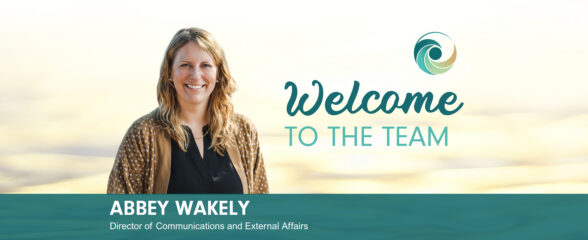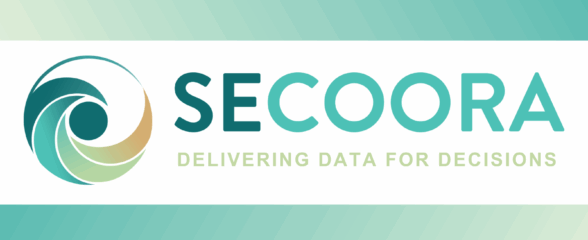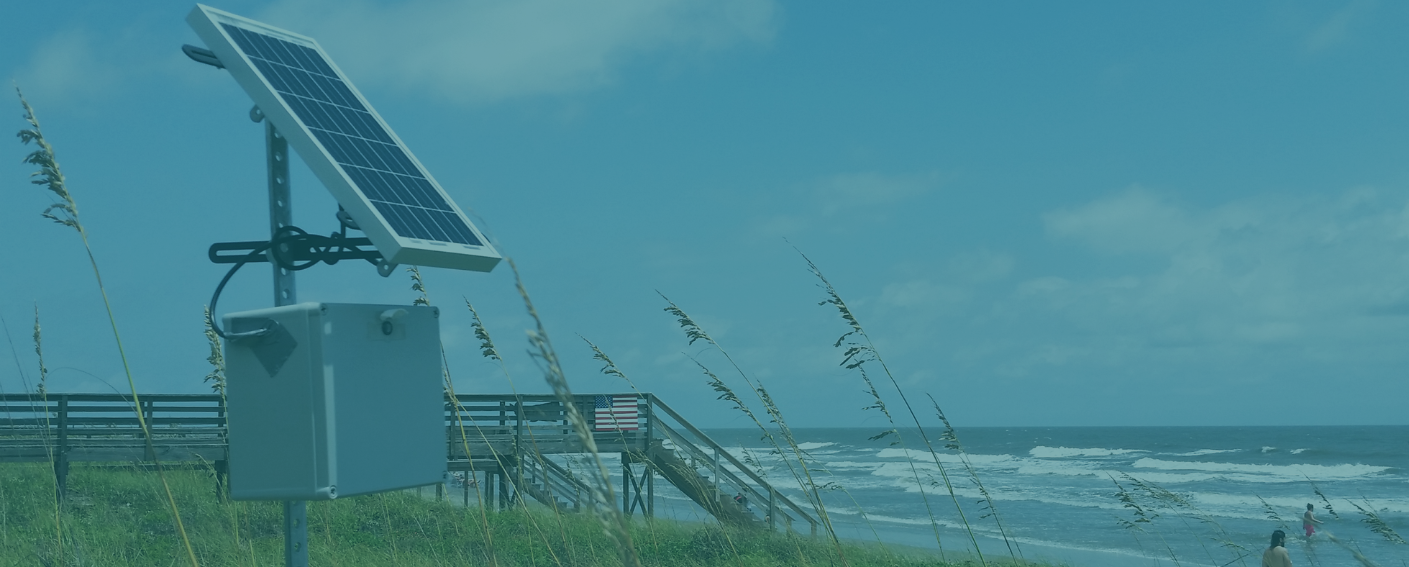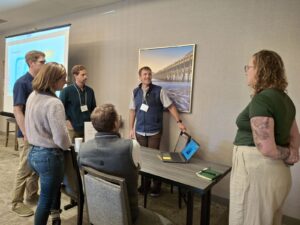The WebCOOS Technical Workshop brought together the WebCOOS science team and contractors, representatives from multiple IOOS Regional Associations, federal partners, and local community partners. Participants learned about webcam installations, products, and standards, along with how to support future installations and streamline data ingestion.
The meeting included traveling to local WebCOOS camera locations, hearing from a panel of community partners, participating in breakout sessions with WebCOOS science team members, and learning from technical sessions and demonstrations. A full, detailed workshop summary can be found on the workshop page.
This workshop was primarily funded by a NOAA IOOS Ocean Technology Transition grant. Thank you also to SwimSmart Technology, LLC for being a workshop sponsor, and to Cambria Hotel Charleston Riverview for hosting us.
Visiting Camera Locations
Participants visited three local WebCOOS cameras:
- Folly Beach, where participants learned about the challenges and benefits of monitoring beaches with web cameras.
- Charleston Harbor, where they learned about co-locating a WebCOOS camera with a NOAA tidal station that measures water level.
- The Rosemont Community, where they learned about community challenges, priorities and ongoing projects, and how the camera documents flooding impacts.
A Day of Learning
The second day of the workshop included an overview of the project and its history and discussions of plans to scale up to a national webcam coastal observation system. Federal partners shared examples of camera hardware, use cases, and connections to WebCOOS, and took questions from the audience.
Participants heard from a panel of local community members and end users about making web camera data useful and sustainable. Panelists included:
- Herbert Maybank (Rosemont Community & CCRAB)
- Jonathan Lamb (NOAA National Weather Service’s Charleston Weather Forecasting Office)
- Najeema Washington (CCRAB)
- Nicole Elko (American Shore & Beach Preservation Association and Elko Coastal Consulting)
- Shawn Smetana (Charleston County Government)
- Skip Mikell (CCRAB)
The WebCOOS science team presented on the current status of product implementation, followed by a breakout session. Small groups of participants rotated through product-based tables to ask WebCOOS experts questions relevant to their region’s interests and applications. The four table discussions covered the following topics:
- Shoreline change, led by Joe Long (UNC Wilmington)
- Rip currents, led by Alex Pang (University of California Santa Cruz) and Greg Dusek (NOAA)
- Flooding, led by Dwayne Porter (USC) and Bob Heitsenrether (NOAA)
- Situational awareness and object detection, led by Jeremy Cothran (USC)
Dennis Murphy (Surfline\Wavetrak, Inc.) led a technical session on camera installations, addressing issues of power, connectivity, and infrastructure.
The day’s discussions closed out with a review of a decision tree flowchart drafted to codify and document the process of adding a camera to the WebCOOS network. The day ended with an evening social networking event and presentation from Jacob Soter of SwimSmart Technology, LLC.
Applying WebCOOS Technology
The final day of the workshop concluded with technical sessions and demonstrations.
The technical sessions featured the following:
- Theo Jass (SECOORA) and the WebCOOS team led a case study of camera considerations at a potential site in Oregon.
- Dennis Murphy (Surfline) shared hardware considerations to look for in setting up a camera.
- Josh Rhoades (Axiom Data Science) led a session on data management in WebCOOS.
After the technical sessions, the demonstration session featured the following:
- An introduction to Surfzone AI from Paul Ganev (Surfline)
- A demonstration of live camera feeds and an example camera from Dennis Murphy (Surfline)
- A hands-on “show and tell” style presentation by Jeremy Cothran (USC), who brought examples of the camera and data processing hardware he uses in his work with WebCOOS.
Looking Ahead
To close the workshop, Debra Hernandez and Greg Dusek led a final session on programmatic considerations and next steps in executing the grant.
Next year, WebCOOS will lead another workshop focused on potential new applications, products, and uses of the data. Date and location are TBD.
Related news

Abbey Wakely Joins SECOORA as Director of Communications and External Affairs
SECOORA welcomes Abbey Wakely as their new Director of Communications and External Affairs, where she will lead strategic engagement, communications, and external relations to strengthen the organization’s regional impact.

SECOORA Request for Proposals for a Data System Development, Operations, and Maintenance Service Provider
SECOORA seeks a Data System Development, Operations, and Maintenance (DMAC) service provider to act as a strategic partner while maintaining the current SECOORA Data System. Proposals are due to SECOORA by 5:00 PM ET, March 31, 2026.

Plankton Perfect: Using Imagery to Document Microscopic Marine Life
Dr. Enrique Montes is working to understand how plankton respond to changes in the ocean by capturing high resolution imagery with advanced technology. This work is funded by the Marine Biodiversity Observation Network (MBON) to use novel techniques like the Continuous Particle Imaging and Classification System (CPICS).


